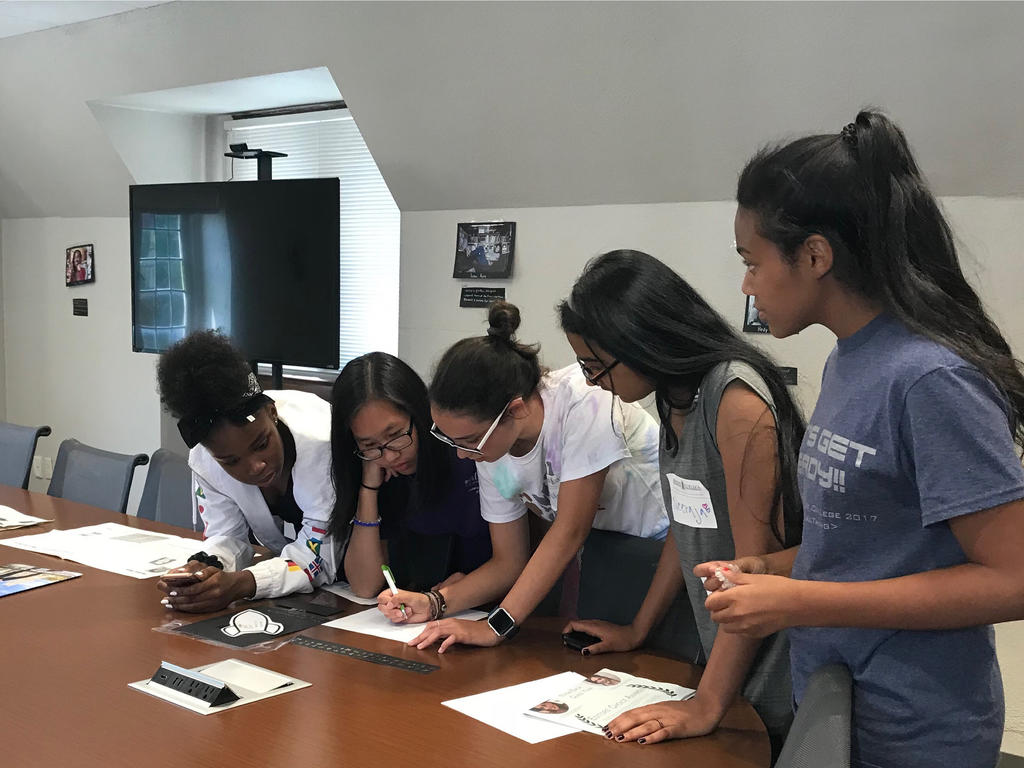In 2017, women made up only 26 percent of the computing workforce, according to the National Center for Women and Information Technology. Professors Betsy Sanders and Brian Larkins of Rhodes’ Department of Mathematics and Computer Science say they hope that with programs such as Camp Codette, that percentage will surge in the future.
This is the fourth year that Rhodes has presented the camp, which brings middle and high school girls on campus to learn programming concepts as well as receive mentoring from Rhodes faculty and students. This summer, 49 campers hailing from public and private schools and a variety of backgrounds, spent July 23-27 creating “Escape the Room” games using the visual programming language Scratch. They were challenged to design games in which players have to solve puzzles and locate hidden objects in order to get out of the rooms. They also physically explored escape rooms in Rhodes’ Briggs Hall, built with props by Rhodes computer science students.
“Computer science is really a creative field, and I think to close the gender gap is to demonstrate to women at an early age that it is not just sitting around computing numbers, but rather that the work can be enjoyable and light up all different parts of the brain,” says Larkins. “Both boys and girls can get the idea that they’re not good at math or science, and that it’s hard. If no one says to them that they can be good at those subjects, that idea can be perpetuated. We have to say, ‘Math or science can be hard, but let’s look at how to use it, and let’s place you into a more supportive environment, such as Camp Codette, that is going to help you win.’”
Sanders and Larkins directed the camp with the assistance of rising seniors Rachel Fox, Emily Wilson, and Natalia Dobrowolski. In addition, Rhodes’ information technology staff provided support. Campers also participated in a scavenger hunt to seek out and meet Rhodes faculty.
“It would be great if most computer scientists went to a liberal arts college such as Rhodes to learn those non-technical skills,” says Sanders. “Communications skills are so important for computer scientists, because they have to think on their feet and tell a computer what to do. They have to think logically and solve problems.”
One of the camp activities that stressed communication and problem-solving skills involved the campers collaborating on how to design dresses out of tinfoil. “We talked about when you’re designing code for a client, the importance of really understanding the ins and outs of the software program and how the client will interact with it,” says Sanders. “And then I told them I wanted them to design dresses out of tinfoil that would have to hold up while they danced in them. One of the main things we tried to do at the camp was to just make it fun.”
Campers also explored Rhodes’ virtual reality research lab, which was created as a result of a grant Sanders received from the National Science Foundation in 2014. The lab includes a high-tech locomotion interface that allows users to physically walk the size of the room and explore a virtual environment. Campers met Sanders’ research assistants, who talked about their work and what it is like working in the lab. At the end of Camp Codette, participants presented what they had learned to friends and family. “We wanted them to be able to come through the week with programs complete enough to showcase, and they did,” says Larkins.
